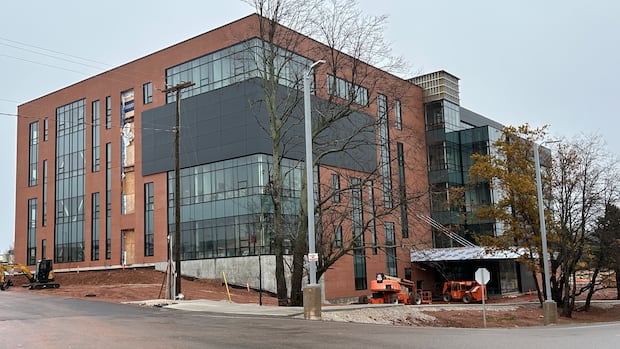Science
UPEI Launches Innovative Medical Simulation Centre for Training

The University of Prince Edward Island (UPEI) has inaugurated its new Clinical Learning and Simulation Centre (CLSC), aimed at enhancing the training of future healthcare professionals. This facility allows students to engage in realistic medical scenarios using advanced technology and standardized patients.
Catherine O’Brien, a seasoned actor and director with prior experience in medical simulations at the University of Toronto, plays a crucial role at the CLSC. She works part-time as a standardized patient, helping students develop essential skills, such as effective communication and empathy. “They will learn how to interview, how to ask the right questions, how to make the patient feel comfortable using empathy,” O’Brien explained during a recent broadcast from the UPEI campus.
The CLSC provides a controlled environment where students can practice various medical scenarios, responding to patient symptoms and refining their clinical skills. O’Brien emphasized the importance of creating a safe space for students to learn without the pressure they might face in real-life situations.
Bridging Theory and Practice
According to Paul Charles, the simulation program manager at the CLSC, the training encompasses more than interactions with standardized patients. The centre also features realistic clinical settings, including hospital rooms equipped with medication carts and vital signs monitors. “We do that by recreating the simulation rooms like clinical hospital rooms, where they’re actually going to see medication carts and vitals machines, all the way to using manikins that can breathe and talk and cough and have heart attacks and seizures,” Charles stated.
This comprehensive approach aims to enhance students’ competence and confidence, ultimately leading to improved patient outcomes and reduced strain on the healthcare system. Additionally, Tammie Muise, the centre’s director, noted that the facility’s resources are also available for continuing education among healthcare professionals.
A notable addition to the CLSC is the “simulation rig,” a mobile unit designed to replicate real-world emergency scenarios. The rig simulates the interior of an ambulance, allowing healthcare workers to practice critical skills in urgent situations, such as responding to a stroke or heart attack. “They can really fine-tune those skills to help improve patient outcomes,” Muise explained.
Engaging Future Healthcare Providers
As UPEI’s medical school prepares for its inaugural classes, O’Brien looks forward to working with the first cohort of students. She expressed enthusiasm about the upcoming training sessions, emphasizing the importance of hands-on experience in medical education.
The CLSC is part of a broader effort by UPEI to integrate innovative training methods into its medical curriculum. By utilizing advanced simulation techniques, the university aims to produce well-prepared healthcare professionals who can meet the challenges of modern medicine.
UPEI’s new centre not only enhances educational experiences for students but also contributes to overall improvements in healthcare delivery. With a strong focus on practical training, the CLSC represents a significant advancement in medical education on Prince Edward Island.
-

 Science3 months ago
Science3 months agoToyoake City Proposes Daily Two-Hour Smartphone Use Limit
-

 Health4 months ago
Health4 months agoB.C. Review Reveals Urgent Need for Rare-Disease Drug Reforms
-

 Top Stories4 months ago
Top Stories4 months agoPedestrian Fatally Injured in Esquimalt Collision on August 14
-

 Technology3 months ago
Technology3 months agoDark Adventure Game “Bye Sweet Carole” Set for October Release
-

 World3 months ago
World3 months agoJimmy Lai’s Defense Challenges Charges Under National Security Law
-

 Lifestyle4 months ago
Lifestyle4 months agoVictoria’s Pop-Up Shop Shines Light on B.C.’s Wolf Cull
-

 Technology3 months ago
Technology3 months agoKonami Revives Iconic Metal Gear Solid Delta Ahead of Release
-

 Technology3 months ago
Technology3 months agoApple Expands Self-Service Repair Program to Canada
-

 Technology3 months ago
Technology3 months agoSnapmaker U1 Color 3D Printer Redefines Speed and Sustainability
-

 Technology3 months ago
Technology3 months agoAION Folding Knife: Redefining EDC Design with Premium Materials
-

 Technology4 months ago
Technology4 months agoSolve Today’s Wordle Challenge: Hints and Answer for August 19
-

 Business4 months ago
Business4 months agoGordon Murray Automotive Unveils S1 LM and Le Mans GTR at Monterey









